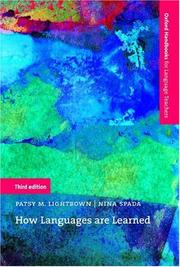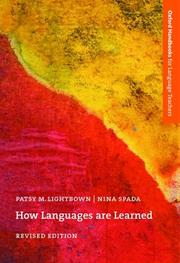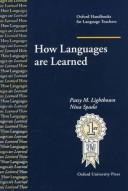| Listing 1 - 10 of 10 |
Sort by
|
Book
ISBN: 9027214824 9027246904 Year: 2024 Publisher: Amsterdam/Philadelphia John Benjamins Publishing Company
Abstract | Keywords | Export | Availability | Bookmark
 Loading...
Loading...Choose an application
- Reference Manager
- EndNote
- RefWorks (Direct export to RefWorks)

ISBN: 9780194422246 0194422240 Year: 2006 Publisher: Oxford : Oxford university press,
Abstract | Keywords | Export | Availability | Bookmark
 Loading...
Loading...Choose an application
- Reference Manager
- EndNote
- RefWorks (Direct export to RefWorks)
Language acquisition --- Language and languages --- Langage --- Langage et langues --- Study and teaching --- Acquisition --- Etude et enseignement --- Second language acquisition --- LANGAGE ET LANGUES --- ACQUISITION --- Acquisition linguistique
Book
ISBN: 9789027246905 9789027214829 Year: 2024 Publisher: Amsterdam John Benjamins
Abstract | Keywords | Export | Availability | Bookmark
 Loading...
Loading...Choose an application
- Reference Manager
- EndNote
- RefWorks (Direct export to RefWorks)
This volume presents the second edition of the Communicative Orientation of Language Teaching (COLT) Observation Scheme. Since the book’s original publication, COLT has become well established as a research instrument in L2 teaching and learning. This new edition brings COLT into the 21st century by introducing digital versions of the scheme and describing how advances in technology have made the collection, coding, analysis, and synthesis of classroom data faster and more efficient. Enhancements include the availability of web-based platforms for the coding, sharing and storage of data, the application of artificial intelligence in the coding of classroom observation data, numeric coding systems, and ongoing work in the use of automatic speech recognition for faster transcription. The volume has a similar organizational structure to the original COLT book with the addition of a new chapter on Digital COLT (Part A), a new section on Numeric COLT (Part B), and an expanded final chapter that includes updated summaries reporting on the use of COLT for a wide range of research purposes in diverse L2 contexts. As with the first edition, the material is presented in a user-friendly manner with examples, illustrations and hands-on activities throughout. It is intended for both novice and experienced researchers investigating teaching and learning in L2 classrooms and in teacher education/reflective practice research.
Book
ISBN: 9780194541268 0194541266 Year: 2019 Publisher: Oxford: Oxford university press,
Abstract | Keywords | Export | Availability | Bookmark
 Loading...
Loading...Choose an application
- Reference Manager
- EndNote
- RefWorks (Direct export to RefWorks)
Now in its 4th edition, How Languages are Learned is highly valued for the way it relates language acquisition theory to classroom teaching and learning and draws practical implications from the research for the language classroom. How Languages are Learned is widely-used as a reference book on teacher training courses, and for new and experienced practicing teachers. This prize-winning, readable introduction to research in language acquisition is recommended reading for second language teachers worldwide. Unlike many introductions to the field of language acquisition research, How Languages are Learned does not assume that you are already familiar with research methods or theories. Its clear, readable style and absence of unnecessary technical jargon has helped to make it a standard text for trainee teachers throughout the world. There are evaluations and case studies throughout the book so that you can see a practical context for the research ideas you are reading about. Many of these examples are taken directly from real first and second language classrooms. The new Activities feature provides opportunities for you to think through the research being discussed. Each chapter ends with Questions for Reflection which draw on your experiences of language learning and teaching and your critical thinking skills to revise the chapter content. Reference to language acquisition research has been updated throughout the chapters and suggestions for further reading. Features include: Relates theories of first and second language acquisition to what actually goes on in the classroom; Uses activities throughout to explore the practical implications of the ideas presented; New updated content gives teachers information about recent research on L2 learning; New Activities and Questions for Reflection personalize content and support critical thinking; New Extra Activities, Study Questions, and videos available online at www.oup.com/elt/teacher/hlal - Publisher.
Psycholinguistics --- Didactics of languages --- Langues --- Langue maternelle et langue seconde (enseignement des langues) --- Second language acquisition --- Language and languages --- Etude et enseignement --- Study and teaching --- Language acquisition --- Language transfer (Language learning) --- Interlanguage (Language learning) --- Language --- Language Development --- Multilingualism --- Acquisition of language --- Developmental linguistics --- Developmental psycholinguistics --- Language development in children --- Psycholinguistics, Developmental --- Interpersonal communication in children --- Second language learning --- Bilingualism --- Development, Language --- Developments, Language --- Language Developments --- Languages --- Languages, Mixed --- Transfer, Language (Language learning) --- Acquisition --- Étude et enseignement. --- Dialect --- Dialects --- Language Acquisition --- Acquisition, Language --- Étude et enseignement

ISBN: 0194370003 9780194370004 Year: 1999 Publisher: Oxford: Oxford university press,
Abstract | Keywords | Export | Availability | Bookmark
 Loading...
Loading...Choose an application
- Reference Manager
- EndNote
- RefWorks (Direct export to RefWorks)
#KVHA:Taalonderwijs --- 800.7 --- 800.7 Taalonderwijs. Taalverwerving --- Taalonderwijs. Taalverwerving --- Language acquisition --- Second language acquisition --- Vreemdetalenonderwijs ; didactiek --- Acquisition d'une langue seconde. --- Acquisition du langage. --- Enseignement des langues. --- Langage et langues --- Langage --- Language Development. --- Language acquisition. --- Language and languages --- Langue seconde --- Méthodologie. --- Second language acquisition. --- langage --- langue étrangère --- Étude et enseignement --- Étude et enseignement. --- Acquisition. --- Study and teaching --- Methodology. --- Apprentissage (psychologie). --- Enseignement. --- LANGUES VIVANTES --- ACQUISITION D'UNE SECONDE LANGUE --- ACQUISITION DU LANGAGE --- ETUDE ET ENSEIGNEMENT --- Langues --- Langue maternelle et langue seconde (enseignement des langues)
Book
ISBN: 9780194406291 Year: 2021 Publisher: Oxford Oxford University Press
Abstract | Keywords | Export | Availability | Bookmark
 Loading...
Loading...Choose an application
- Reference Manager
- EndNote
- RefWorks (Direct export to RefWorks)
Digital
ISBN: 9780194541268 Year: 2013 Publisher: Oxford Oxford University Press
Abstract | Keywords | Export | Availability | Bookmark
 Loading...
Loading...Choose an application
- Reference Manager
- EndNote
- RefWorks (Direct export to RefWorks)
In dit boek worden de belangrijkste theorieën over eerste- en tweedetaalverwerving besproken. Je krijgt ook een staalkaart van recent onderzoek naar taalverwerving. Het eerste hoofdstuk bekijkt hoe kinderen een taal leren. Het tweede hoofdstuk bekijkt tweedetaalverwerving. In het derde hoofdstuk lees je hoe persoonlijke eigenschappen van leerlingen (zoals extraversie, intelligentie, leeftijd en motivatie) een invloed kunnen hebben op het succes bij het leren van een tweede taal. Het vijfde hoofdstuk bespreekt theorieën die tweedetaalverwerving verklaren. In het zesde hoofdstuk wordt er gekeken naar de klassituatie en het verschil tussen een klas en een natuurlijke omgeving om een taal te leren ('op straat'). Hoofdstuk 6 geeft zes voorstellen of tips bij taallessen aan anderstaligen. Het zevende hoofdstuk bespreekt populaire ideeën over taalverwerving en onderzoek hiernaar.
Book
ISBN: 0194222241 Year: 2006 Publisher: Oxford Oxford university press
Abstract | Keywords | Export | Availability | Bookmark
 Loading...
Loading...Choose an application
- Reference Manager
- EndNote
- RefWorks (Direct export to RefWorks)

ISBN: 0194371697 9780194371698 Year: 1996 Publisher: Oxford: Oxford university press,
Abstract | Keywords | Export | Availability | Bookmark
 Loading...
Loading...Choose an application
- Reference Manager
- EndNote
- RefWorks (Direct export to RefWorks)
Psycholinguistics --- Didactics of languages --- Langage et langues --- Etude et enseignement --- Méthodologie --- Langage --- Language acquisition. --- Language and languages --- Acquisition --- Acquisition du langage. --- Langage et langues - Etude et enseignement - Méthodologie
Digital

ISBN: 9783110197372 9783110179705 Year: 2008 Publisher: Berlin ;; Boston De Gruyter Mouton
Abstract | Keywords | Export | Availability | Bookmark
 Loading...
Loading...Choose an application
- Reference Manager
- EndNote
- RefWorks (Direct export to RefWorks)
| Listing 1 - 10 of 10 |
Sort by
|

 Search
Search Feedback
Feedback About UniCat
About UniCat  Help
Help News
News